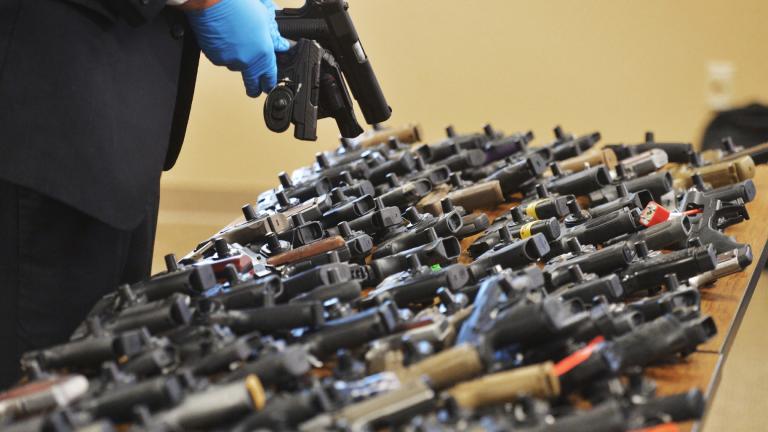 (WTTW News)
(WTTW News)
In the month that owners of guns classified by Illinois as assault weapons have had to register their firearms with the state, 2,430 individuals have done so.
It’s impossible to know how many Illinois residents own the guns and parts they’re required to register under the Protect Illinois Communities Act. An Illinois State Police spokesman declined to share a projection. The number is likely multiples more than have registered, considering the popularity of AR-15-style guns and the 2.4 million Illinoisians with Firearm Owners Identification cards.
Since the Protect Illinois Communities Act became law in early 2023, the sale of hundreds, if not thousands, of types of guns, cartridges and accessories has been illegal in Illinois. The law lists specific models, but it’s not an exhaustive list.
Those who owned the covered guns prior to the law can keep them but are required to register them with the state.
There’s time yet; the deadline to file what’s called an assault weapon endorsement is Jan. 1.
But prominent gun rights advocates have hinted that many people will not just wait, but instead will bypass registration completely.
What then?
State Rep. Brad Halbrook (R-Shelbyville) said the registry is near the top of the “million” reasons he voted against the law last January.
He raised the issue last week, during one of three hearings ISP held before the agency moves to advance rules on the law’s implementation.
“We know this public hearing is taking place because the governor and his radical left agenda — he and his Democrat legislators passed this bill and then laid it at your feet to have to deal with it,” Halbrook said at the Springfield hearing. “I support law enforcement unapologetically, and we know this is not your fault. However, there are questions that need to be answered.”
Questions like, as Halbrook put it, “What happens when hundreds of thousands of gun owners are non-compliant overnight and otherwise, they’re just otherwise totally law-abiding citizens? What is going to be their punishment for non-compliance?”
The law itself is specific about the penalties that could face gun owners who fail to file affidavits.
Failure to file an endorsement affidavit is a Class A misdemeanor on the first offense.
A second, or subsequent, violation of the registration requirement would be classified a Class 3 felony.
As ISP puts it an FAQ web page, “persons who violate the endorsement affidavit requirements may be arrested and charged.”
Note the “may.”
In response to Halbrook’s question, ISP’s Suzanne Bond said that “it will be up to each individual state’s attorney in the 102 counties to decide how they will enforce that.”
If a state’s attorney declines to prosecute, there may be no charges filed, no conviction, no penalty; if a state’s attorney decides to pursue charges, a gun owner could face prison time.
The questions come as gunowners complain that the law is too vague.
Bond repeatedly answered questions from gun owners at the hearing seeking specifics about what does and does not qualify as an assault weapon under the law.
Is a “safety to tent spring that goes into a pistol grip that fits an AR-15-style rifle” considered an assault weapon attachment?
No, Bond said.
What about a “pistol grip screw that is specifically marketed for affixing a pistol grip to an AR-15-style riffle”?
Also no, Bond said, meaning that registration is unnecessary.
But pistol grips are assault weapon attachments, and owners would need to file a registration form.
Momentum for the law built after the 2022 mass shooting at Highland Park’s Independence Day parade, when the alleged shooter used a legally purchased AR-15-style rifle to kill seven people and injure dozens more.
Kathleen Sances, CEO of the Gun Violence Prevention PAC, testified at ISP’s Chicago hearing last week that “gun extremists in the state have waged a merciless disinformation campaign, attempting to find new ways to water down” the law.
She said the complaints, questions and lawsuits distract from “what made this law necessary in the first place. We are here because a man armed with a semi-automatic rifle decided to open fire on a crowd trying to enjoy their holiday.”
Sances called lawsuits against the act a “wasteful use” of the court system.
But the possibility remains that the entire law could be found unconstitutional, and the registration requirements with it.
Halbrook also questioned what would happen to the registry should that happen — would ISP then destroy its contents? That would likely be up to a court to decide, Bond said.
Will the registry be used for other purposes, like to later seize firearms, Halbrook asked.
State police are “not aware of any intent to do so,” Bond said.
Follow Amanda Vinicky on Twitter: @AmandaVinicky








